H.E. BAN KI-MOON,
UN SECRETERY GENERAL,
UN SECRETARIAT, NEW YORK,
USA
YOUR EXCELLENCY,
MEMORANDUM
THE WUM SAGA: THE PLIGHT OF BRITISH SOUTHERN CAMEROONS UNDER IMPERIAL RULE
History has demonstrated again and again over the centuries that an imperial power respects no standards and no law. It is simply an embodiment of evil. It is easier for hawks in their numbers flapping their wings to chase away a lion from its prey than to have an imperial power feeding fat on its occupied land to respect international law, conventions and good conscience and withdraw honorably. This explains the case of imperial la Republique du Cameroun in British Southern Cameroons. But the day of reckoning as declared by the Lord of justice is not far.
On Friday April 22nd, 2016, some 19 detainees from Wum, Menchum County of British Southern Cameroons who had been in the Bamenda detention camp since January 2016, for fear of confrontation with the population, were under the cover of darkness transferred to Yaounde, la Republique du Cameroun. Prior to being transferred under heavily armed troops, these defenseless suspects, as if this detention under life-threatening conditions was not bad enough, were tortured to break their will power and spirits. The 19 transferred to Yaounde by Order No.090/ORD/C1/16 of April 16, 2016 signed by Chief Judge of the Yaounde Military Court, Captain Fredric POH MBOLULE are;
- Quala Dze Queenta____________ born on Dec. 02, 1993. She is pregnant.
- Livingstone Fung Achuo________ Oct. 10, 1990
- Joseph Afuh Ngourou__________ March 02, 1975
- Mamouda Sule________________ May 20, 1998
- Azang Hamlep Azang___________ born in about 1998
- Kingsley Njuh Kelley___________ born in about 1989
- Abang Modest Amih___________ born on April 25, 1993
- Nasser Fontoh_________________ March 03, 1985
- Ngong Solos Wallang____________ May 13, 1974
- Franck Tsu Itie_________________ in about 1979
- Gerald Kum Chou______________ on March 16, 1985
- Nestor Kangsen Mbah___________ on Feb. 14, 1992
- Marcel Fung Mih_______________ July 22, 1989
- Ewi Alain Meeh________________ Aug. 28, 1993
- Bruno Lumba Nkemta___________ in 1985
- Canisius Ngong Yoh_____________ in 1989
- Emmanuel Achou Kum__________ on March 30, 1998
- Tibi Vincent Tebug alias Ojong____ born on Oct. 02, 1978
- Tem Josua Mua_________________ born on Sept. 13, 1999
Plus two soldiers working in Wum;
- Athanase Ateba Mvodo
- Pierre Gaetan Kame Nkoo
This Order which is issued completely in French, and that dictates the language of the masters and in which they will be tried, concludes that these suspects will be at the Kondengui Maximum detention till Oct. 07, 2016. That is to say Queenta’s baby who had been a prisoner in the womb will be born a prisoner without a crime except that God created him/her a British Southern Cameroonian.
The 19 suspects were not arrested in the act but many days later through a kale-kale in Wum town and as such should be presumed innocent until proven guilty by the law. This kale-kale, as usual, took place in the wee hours of the morning when peace loving citizens are deep asleep.
These are not the first Southern Cameroonian suspects arrested in Southern Cameroons for allegedly committing a crime on British Southern Cameroons soil which falls under the Common Law jurisdiction that have had to be transferred without the knowledge of their family members and lawyers. Since the 1992 episode in which late Justice Nyo Wakai, a retired Judge of the Supreme Court, and one hundred and seventy two (172) other leaders and militants of the SDF detained at the BMM Up-Station, Bamenda, after the heavily flawed presidential elections of October 1992 in which the victor, Ni John Fru Ndi, a Southern Cameroonian, became the vanquished, many other Southern Cameroonians have suffered this same high handed barbarism of la Republique du Cameroun.
Your Excellency, what provoked mob action that led to the burning of the make-shift military barracks in Wum was the murder of Leonard Mih Ngong aged 23 years by a francophone soldier in the night and the insensitive attitude of the proconsuls who treated it as if it were the death of a careless chicken. This nonchalant attitude only came to ignite held up anger, a sad reminder of several complaints tabled against the forces to the authorities who did nothing to establish healthy relationship between civilian population and the forces who behave as lords of a conquered territory. While the population is mourning the irreparable and irreplaceable lose of their dear son, compatriot and bread winner of the poor family, no one is talking about the Francophone murderer soldier who like others before was immediately protected. The murder of Leornard Mih Ngong over his snatched girl friend was a premeditated act. Similar murders by these occupation forces, such as that of Mbengwi, to teach “les Anglos” an unforgettable lesson have taken place in the past in other towns of British Southern Cameroons. What happens is immediate transfer of the holier than thou “home” and that ends the story.
Beginning from the Ebubu, Tombel massacre in 1962, the numerous unprovoked kale kales, the Black Saturday in Ndu, the states of emergency of the 1990, 1992, 1997 and the economic blockade of 1993, code named Operation Dorade, the murder of unarmed peace-loving SCNC activists in Kumbo, on Oct. 1st. 2001 and other acts of vandalism, these and more have made the Southern Cameroonian conclude that under la Republique du Cameroun he is neither safe, secured nor has he hope and a future in freedom and dignity. This reminds him of the good old days of British Southern Cameroons where, in freedom, under rule of law, enjoying social justice, he was his own master with the sky as the only limit.
Your Excellency, Sir, the one billion dollar question is, if this is not concrete evidence of treating British Southern Cameroons and its people as a conquered and occupied land and subjugated people, how many citizens of la Republique du Cameroun arrested, for an alleged crime committed on their
home soil, have been transferred for trial under the Common Law jurisdiction in British Southern Cameroons? To the Yaounde authorities the people of British Southern Cameroons are a subjugated people with no rights, no dignity: disregarding uti possedetis juris and the critical date and Art. 4(b) of the AU Constitutive Act, this former UN Trust territory does not exist to merit any respect.
Having with impunity flouted the Banjul Ruling on Communication 266/2003 approved by the AU Summit of July 2009 which recognized Southern Cameroonians as a distinct people, from those of la Republique du Cameroun, entitled to the unquestionable right of self-determination and called for Constructive Dialogue, the annexationist regime has continued to intensify its military repression. Furthermore, it has continued to kidnap our fellow compatriots and like looted cargo humiliatingly ferry them to la Republique du Cameroun for brutal and dehumanizing interrogation, torture and trial under kangaroo courts. This is in gross violation of the Banjul Ruling in which the Commission called on the Respondent State, la Republique du Cameroun, to forth with put an end to “the transfer of accused persons from the Anglophone Provinces (British Southern Cameroons) for trial in the Francophone Provinces.” The Respondent State is called upon to ensure “that every person facing criminal charges be tried under the language he /she understands.”(Emphasis, mine).
This calls to question the so called bi-cultural, bi-jurial, and bilingual Cameroun which the apologists of the Yaounde regime, to protect their crumbs, propagate and pretentiously defend. If no citizen of la Republique du Cameroun brought up under the Civil Law system has ever been transferred for trial under the Common Law jurisdiction, why should citizens of British Southern Cameroons brought up under the Common Law be transferred and tried under the Civil Law in a foreign language – French?
Sir, nothing illustrates the unbearable and humiliating treatment British Southern Cameroonians are subjected to than the contrasting treatment Wum suspects have had to endure and humane treat given Mora, Far North Region of la Republique du Cameroun where the Boko Haram insurgents are marauding. For those who doubt or question the reasoned presentation in this Memorandum, let them find out how the Yaounde authorities responded to the setting ablaze of the barracks in Mora in October 2015 by a mob. Was there a kale-kale? Were there arrests and humiliating torture in public and are there any now languishing in Kondengui Maximum Prison, Yaounde like those of Wum?
We must here firmly understand one thing: neither imperialism nor annexation can be reformed. It is hard core evil pure and simple. It must be over thrown for the subjugated people to regain their freedom and dignity. The Yaounde state will never treat British Southern Cameroons as the equal of la Republique du Cameroun due to non-implementation of UNGA Resolution 1608 of April 21, 1961 that facilitated annexation and subjugation. We do not belong. British Southern Cameroons and la Republique du Cameroun can never belong as equals under one national polity. Historically, culturally and legally, they belong apart and for peace based on justice and stability in the region, separation respecting colonial inherited boundary is the only permanent solution.
Your Excellency, if the international community is not begging for another Rwanda, to nip the inevitable in the board, they all should mount pressure on la Republique du Cameroun to submit to the Constructive Dialogue under the Good Offices of the African Commission as approved by the AU Summit of July 2009 in Libya. Consistent repression, kale-kales ( i.e. organised state terrorism), transfer of suspects for trial in a foreign language under the civil law system, persistent killings of unarmed civilians by occupation forces, economic rape, among others, has put the two distinct Cameroons, held together by the barrel of the gun, on a ticking time bomb: the inevitable explosion will have grave consequences for the AU and the UN as a whole for their prolonged culture of silence.
Where has it, annexation or imperialism, triumphed unto eternity? British Southern Cameroons will not be the exception!
As for our compatriots kidnapped to the gulag in Yaounde as if they were war captives to await the worse;
YOUR EXCELLENCY, WE SOLEMNLY APPEAL;
To the UN and international community at large, all defenders of human rights and fundamental freedoms, the rule of law and fair trial, to mount pressure on President Paul Biya to bring back these compatriots to British Southern Cameroons where they are alleged to have committed the crime for fair and expeditious trial. To be tried in a foreign land under a strange legal system by foreign judges in a foreign language, which the accused do not understand, will tantamount to persecution not prosecution.
- To the UN, AU, Commonwealth, all human rights organizations committed to justice and the rule of law, to assist in whichever way possible or to monitor the trial of these compatriots and ensure that they receive fair trial and this implies that they should be tried under the Common Law system, investigations and interrogations, the giving of evidence in court and trial are all in English, and the trial is conducted by Common Law Judges.
- That the Francophone soldier murderer is brought back to British Southern Cameroons where he committed the heinous crime and given fair trial under the Common Law system.
In conclusion, the UN having declared annexation a crime against humanity and threat to world peace, remaining silent and withholding your positive action from according these unfortunate people of Wum origin the right of fair hearing and expeditious fair trial, an act which will bring to international lime light la Republique du Cameroun’s annexation, imposition of foreign domination and alien rule in British Southern Cameroons, will tantamount to giving the violator of international law a pat on the back. Saddam Hussein of Iraq never enjoyed such treatment when he annexed Kuwait and reduced it to the 19th Province of Iraq.
We seek JUSTICE within the ambit of international law!
Done, in Buea, this day, 27 April, 2016.
For the SCNC and on behalf of the people of British Southern Cameroons.
____________________________
NFOR, NGALA NFOR
(National Chairman, SCNC)
Cc,
All UN Member Nations,
Chairman of AU Commission, Addis Ababa
President of ICJ, Den Haag,
President of ICC, Den Haag,
President, Pan African Parliament, Johannesburg
African Court of Justice,
Commonwealth SG, London,
President of ACHPR, Banjul,
All Diplomatic Missions, Yaounde
High Commissioner of UN Human Rights Commission, Geneva,
Human Rights Bodies Accredited with the UN, among others.
New Anti-Terrorism Law Batters Cameroonians Seeking Secession
By Mbom Sixtus Reprint |
YAOUNDE, Apr 26 2015 (IPS) – Cameroon’s government under President Paul Biya is bearing down on a separatist movement fighting for the rights of a minority English-language region, using as its weapon a sweeping new anti-terrorism law introduced at the end of last year.
The separatist Southern Cameroons National Council (SCNC) – which is demanding an independent Southern Cameroons made up of Cameroon’s Northwest and Southwest Regions – has been targeted under the new law, which forbids public meetings, street protests or any action that the government deems to be disturbing the peace.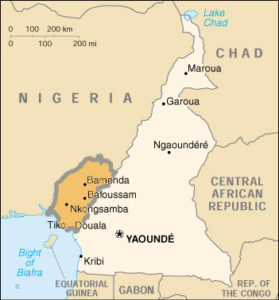
Map showing location of Southern Cameroons (highlighted). Credit: Wikimedia Commons Public Domain
English-speaking Cameroonians make up over 22 percent of the country’s population of 20 million.
Long desired by Western powers for its beauty and natural resources, Cameroon was first occupied by the Germans in 1884. After the First World War, the French and British carved it up between them as League of Nations mandates – four-fifths went to France, the rest to the United Kingdom.
A federation was declared in 1961, followed by the annexation of the English-language region into the United Republic of Cameroon, with its capital in Yaounde in 1972. Dissension continues to seethe, however, in the English-speaking regions which resent the lack of control over their assets.
Over the years, Cameroon has downplayed its problems with the English-speaking regions, while making token placements of a few of their citizens in its administration.
Secessionists say this relationship of inequality has led to impoverishment of the territory and its population and a diminishment of their educational and cultural heritage, while feeding the flame of ethnic strife between the people of the Northwest and Southwest Regions.
The extraction of oil and the expropriation of Cameroon’s substantial oil revenues is frequently cited as the touchstone for frustration and anger among those of the struggling south.
The separatist Southern Cameroons National Council (SCNC) has been targeted under Cameroon’s new anti-terrorism law, which forbids public meetings, street protests or any action that the government deems to be disturbing the peace
In this regard, the Natural Resource Governance Institute (NRGI) gave Cameroon a “failing grade”, ranking it 47th out of 58 countries for such weaknesses as enabling environment, safeguards and quality controls, and reporting practices.
“Cameroon’s national oil company (SNH) dominates the sector,” NRGI reported. “It is directly controlled by the Presidency … The largest revenue streams are collected by SNH and transferred quarterly to the national treasury after subtracting the company’s operational costs – meaning that some oil revenues never reach the treasury.”
Aside from publishing environment impact assessments, Cameroon provides very little information on its extractive sector, noted NRGI, while it performed near the bottom of rankings on measures of budgetary openness and the rule of law.
Oil exploration, production and refining all take place in Southern Cameroons, while oil-derived revenues are paid to the state coffers directly in Yaounde.
Against this background, and since Cameroon’s President Paul Biya endorsed an anti-terrorism law in December 2014, the SCNC has not been able to organise any major gathering.
An attempt this month, on Apr. 3, ended with the arrest of Nfor Ngala Nfor, SCNC Vice National Chairman, and six others in Buea, Southwest Region.
Andrew Kang, who had hosted the SCNC leaders, told IPS from his hospital bed at the Buea Regional Hospital that security forces barged into his house while he and the guests were about to have a meal. “We were not even permitted to eat our food. They just beat us, ordered us to move and led us to the station. We spent four days in a prison cell and only regained freedom at about 5 pm on Apr. 6.”
Kang denied the government’s charges of promoting secession and rebellion which had been levelled against the group.
Talking to IPS, Martin Fon Yembe, a member of the SCNC and human rights activist, said that while the government made it seem that the new anti-terrorism law was designed to boost the fight against Boko Haram, the main aim was to stop the holding of SCNC meetings and gatherings.
“Everyone knows that law was put in place to hinder the activities of the movement and there is no gainsaying the fact that it poses a problem,” he said.
Related IPS Articles
A U.S. State Department human rights report on Cameroon in 2013 referred to security force torture and abuse, denial of fair and speedy public trials and restrictions on freedom of assembly and association. “Although the government took some steps to punish officials who commit abuses in the security forces and in the public service, impunity remained a problem,” said the report.
Meanwhile, thousands of Southern Cameroonians are currently in exile in Europe and the United States and thousands more are on the run because of their support for the separatist movement.
The Biya administration, on the other hand, presents a picture of a country unswervingly headed for growth. In a document titled Cameroun Vision 2035, a long-term vision is described which envisages the consolidation of democracy, enhancement of national unity, economic development and increasing employment.
Under a three-year plan, unveiled in December, Cameroon will spend 1.75 billion dollars “to meet the immediate needs of the population,” focusing on sectors such as road infrastructure, health, agriculture, energy and security.
“The special programme, evaluated at 925 billion CFA francs, is financed through the mobilisation of the required resources from local and international financial institutions at sustainable rates,” Prime Minister Philemon Yang said without giving further details.
In the latest twist to the South Cameroons issue, a meeting this month of Cameroon’s English-speaking lawyers gave notice that an All-Anglophone Lawyers Conference would be held shortly in Bamenda, chief city of the Northwest Region, “to develop strategies at safeguarding the Common Law and to map out the way forward for the Southern Cameroons territory,” the Cameroon Concord reported.
The news online was met with over a dozen enthused readers. “Machiavelli Ayuk” of the University of Buea wrote: “This is the kind of action that the marginalised Anglophone people love to hear. At last we have some Educated Elites in the Anglophone zone…”
The comment was followed by “Fast Man”, a self-described fieldworker, who wrote: “I hope the lawyers use their intelligence and remember their oath. We will never go anywhere under French hegemony. God bless the Southern Cameroons and its citizens…
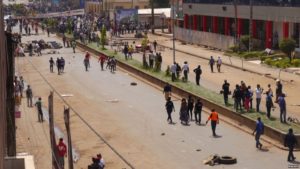 Anti-government demonstrators block a road in Bamenda, Cameroon, December 8, 2016.
Anti-government demonstrators block a road in Bamenda, Cameroon, December 8, 2016.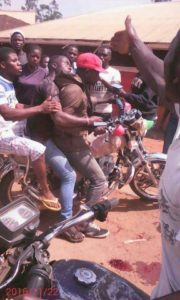

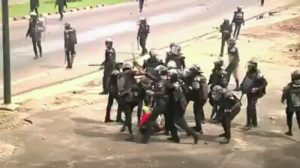

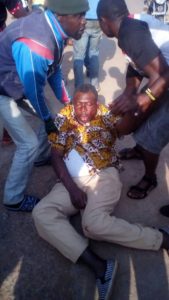 We hail and salute the nationalistic consciousness and patriotism demonstrated by all the people – men, women, youths and students – of British Southern Cameroons in solidarity with the Common Law Lawyers and the ongoing strike declared by the Teachers Trade Unions.
We hail and salute the nationalistic consciousness and patriotism demonstrated by all the people – men, women, youths and students – of British Southern Cameroons in solidarity with the Common Law Lawyers and the ongoing strike declared by the Teachers Trade Unions.





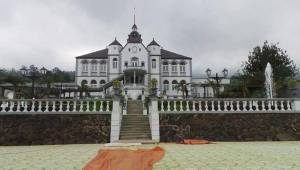 1. The Southern Cameroons has a surface area of 43,000 sq. km and a current population of about 6 million people. It is thus demographically bigger than at least 60 UN and 18 AU Member States, and spatially bigger than at least 30 UN and 12 AU Member States. Located in the ‘armpit’ of Africa, it is sandwiched between Nigeria and Republique du Cameroun like a wedge between West Africa and what in effect is still French Equatorial Africa. It has frontiers to the west and north with Nigeria, to the east with Republique du Cameroun, and to the south with the Equatoria Guinean Island of Bioko. The borders are well attested by international boundary treaties.
1. The Southern Cameroons has a surface area of 43,000 sq. km and a current population of about 6 million people. It is thus demographically bigger than at least 60 UN and 18 AU Member States, and spatially bigger than at least 30 UN and 12 AU Member States. Located in the ‘armpit’ of Africa, it is sandwiched between Nigeria and Republique du Cameroun like a wedge between West Africa and what in effect is still French Equatorial Africa. It has frontiers to the west and north with Nigeria, to the east with Republique du Cameroun, and to the south with the Equatoria Guinean Island of Bioko. The borders are well attested by international boundary treaties.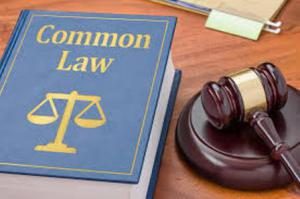 Citizens from former British Southern Cameroons have been wondering what is common law especially those who have not been privy to study law in the University. Cameroon has two types of legal system. The Common and Civil Law. In this article, Donatus Wan-Obi, former UB Student Union Chairman and a legal mind himself, gave the ABC of the common law in the most simple terms for our understanding. It is important that when we talk about Common Law and when we support our lawyers, we should be aware of what we are saying. These short questions and responses will help us gather.
Citizens from former British Southern Cameroons have been wondering what is common law especially those who have not been privy to study law in the University. Cameroon has two types of legal system. The Common and Civil Law. In this article, Donatus Wan-Obi, former UB Student Union Chairman and a legal mind himself, gave the ABC of the common law in the most simple terms for our understanding. It is important that when we talk about Common Law and when we support our lawyers, we should be aware of what we are saying. These short questions and responses will help us gather.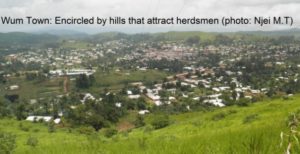


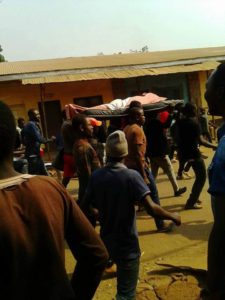
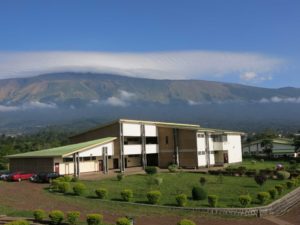 Cameroon’s dictator, Paul Biya, finally promulgated into law the new penal code (Law No. 2016/007 of 12 July 2016).whose adoption by both houses of parliament received condemnation from most national stakeholders including civil society organizations, Bar Council, and protest from lawyers
Cameroon’s dictator, Paul Biya, finally promulgated into law the new penal code (Law No. 2016/007 of 12 July 2016).whose adoption by both houses of parliament received condemnation from most national stakeholders including civil society organizations, Bar Council, and protest from lawyers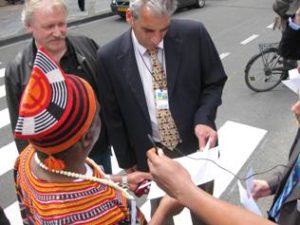 The National Executive Committee, (NECO) and National Council of the Southern Cameroons National Council, (The COUNCIL) met respectively on July, 15 and 16, 2016 in Bamenda. It examined and deliberated on the life of the movement at home and the Diaspora, state of the nation and international scene and took the following Resolutions.
The National Executive Committee, (NECO) and National Council of the Southern Cameroons National Council, (The COUNCIL) met respectively on July, 15 and 16, 2016 in Bamenda. It examined and deliberated on the life of the movement at home and the Diaspora, state of the nation and international scene and took the following Resolutions.